Read Surname Ancestry ResultsOur indexes 1000-1999 include entries for the spelling 'read'. In the period you have requested, we have the following 2245 records (displaying 541 to 550): Single Surname Subscription | | | Buying all 2,245 results of this search individually would cost £13,414.00. But you can have free access to all 2,245 records for a year, to view, to save and print, for £100. Save £13,314.00. More... |
These sample scans are from the original record. You will get scans of the full pages or articles where the surname you searched for has been found. Your web browser may prevent the sample windows from opening; in this case please change your browser settings to allow pop-up windows from this site. Electors for Methley
(1848)
On 14 and 15 December 1848 an election took place for a Knight of the Shire for the West Riding of Yorkshire in the House of Commons. The candidates were Edmund Denison and sir Culling Eardley Eardley, gaining 14,743 and 11,795 votes respectively. The county franchise at this period included freeholders of land worth 40s or more a year; £10 copyholders and long-leaseholders; and £50 short-leaseholders and tenants. This poll book was published in 1849.
Former poll books had been compiled from the sheriff's returns; but as these were now transmitted to the Home Office immediately after an election, in this instance the polling was marked from the check-clerk's returns, carefully compared with the registers marked in the poll booths at the time of voting.
The votes for the respective candidates are indicated by the numerals 1 (Denison) and 2 (Eardley). The omission of these numerals indicates that the elector did not vote. Many names which appear on the register of particular townships are completely omitted in this poll book: in all these cases, the same name will be found recorded in some other township, the elector having two or more qualifications. In such cases, his name only appears in the poll book in the actual township for which he chose to vote; or, if he did not vote at all, in that township for which he was qualified that lay closest to his actual residence.
The townships are arranged alphabetically within polling district; and within each township the names are arranged alphabetically by surname and christian name, and the elector's residence is given. Many of the electors resided outside the township for which they were qualified - some in other counties. Moreover, at the end of each polling district there is a list of persons registered to poll in that district, from townships is other districts. READ. Cost: £6.00.  | Sample scan, click to enlarge
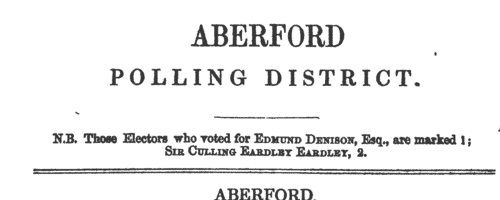
| Electors for Settle
(1848)
On 14 and 15 December 1848 an election took place for a Knight of the Shire for the West Riding of Yorkshire in the House of Commons. The candidates were Edmund Denison and sir Culling Eardley Eardley, gaining 14,743 and 11,795 votes respectively. The county franchise at this period included freeholders of land worth 40s or more a year; £10 copyholders and long-leaseholders; and £50 short-leaseholders and tenants. This poll book was published in 1849.
Former poll books had been compiled from the sheriff's returns; but as these were now transmitted to the Home Office immediately after an election, in this instance the polling was marked from the check-clerk's returns, carefully compared with the registers marked in the poll booths at the time of voting.
The votes for the respective candidates are indicated by the numerals 1 (Denison) and 2 (Eardley). The omission of these numerals indicates that the elector did not vote. Many names which appear on the register of particular townships are completely omitted in this poll book: in all these cases, the same name will be found recorded in some other township, the elector having two or more qualifications. In such cases, his name only appears in the poll book in the actual township for which he chose to vote; or, if he did not vote at all, in that township for which he was qualified that lay closest to his actual residence.
The townships are arranged alphabetically within polling district; and within each township the names are arranged alphabetically by surname and christian name, and the elector's residence is given. Many of the electors resided outside the township for which they were qualified - some in other counties. Moreover, at the end of each polling district there is a list of persons registered to poll in that district, from townships is other districts. READ. Cost: £6.00.  | Sample scan, click to enlarge
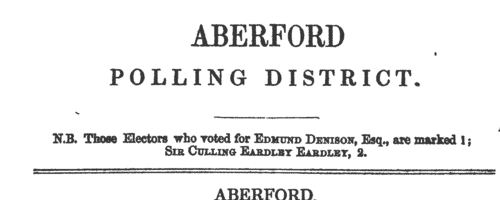
| Electors for Sheffield
(1848)
On 14 and 15 December 1848 an election took place for a Knight of the Shire for the West Riding of Yorkshire in the House of Commons. The candidates were Edmund Denison and sir Culling Eardley Eardley, gaining 14,743 and 11,795 votes respectively. The county franchise at this period included freeholders of land worth 40s or more a year; £10 copyholders and long-leaseholders; and £50 short-leaseholders and tenants. This poll book was published in 1849.
Former poll books had been compiled from the sheriff's returns; but as these were now transmitted to the Home Office immediately after an election, in this instance the polling was marked from the check-clerk's returns, carefully compared with the registers marked in the poll booths at the time of voting.
The votes for the respective candidates are indicated by the numerals 1 (Denison) and 2 (Eardley). The omission of these numerals indicates that the elector did not vote. Many names which appear on the register of particular townships are completely omitted in this poll book: in all these cases, the same name will be found recorded in some other township, the elector having two or more qualifications. In such cases, his name only appears in the poll book in the actual township for which he chose to vote; or, if he did not vote at all, in that township for which he was qualified that lay closest to his actual residence.
The townships are arranged alphabetically within polling district; and within each township the names are arranged alphabetically by surname and christian name, and the elector's residence is given. Many of the electors resided outside the township for which they were qualified - some in other counties. Moreover, at the end of each polling district there is a list of persons registered to poll in that district, from townships is other districts. READ. Cost: £6.00.  | Sample scan, click to enlarge
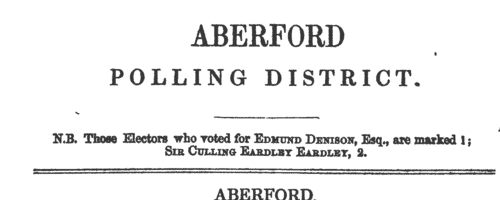
| Electors for Skipton
(1848)
On 14 and 15 December 1848 an election took place for a Knight of the Shire for the West Riding of Yorkshire in the House of Commons. The candidates were Edmund Denison and sir Culling Eardley Eardley, gaining 14,743 and 11,795 votes respectively. The county franchise at this period included freeholders of land worth 40s or more a year; £10 copyholders and long-leaseholders; and £50 short-leaseholders and tenants. This poll book was published in 1849.
Former poll books had been compiled from the sheriff's returns; but as these were now transmitted to the Home Office immediately after an election, in this instance the polling was marked from the check-clerk's returns, carefully compared with the registers marked in the poll booths at the time of voting.
The votes for the respective candidates are indicated by the numerals 1 (Denison) and 2 (Eardley). The omission of these numerals indicates that the elector did not vote. Many names which appear on the register of particular townships are completely omitted in this poll book: in all these cases, the same name will be found recorded in some other township, the elector having two or more qualifications. In such cases, his name only appears in the poll book in the actual township for which he chose to vote; or, if he did not vote at all, in that township for which he was qualified that lay closest to his actual residence.
The townships are arranged alphabetically within polling district; and within each township the names are arranged alphabetically by surname and christian name, and the elector's residence is given. Many of the electors resided outside the township for which they were qualified - some in other counties. Moreover, at the end of each polling district there is a list of persons registered to poll in that district, from townships is other districts. READ. Cost: £6.00.  | Sample scan, click to enlarge
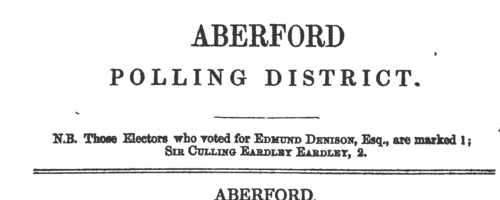
| Electors for Tinsley
(1848)
On 14 and 15 December 1848 an election took place for a Knight of the Shire for the West Riding of Yorkshire in the House of Commons. The candidates were Edmund Denison and sir Culling Eardley Eardley, gaining 14,743 and 11,795 votes respectively. The county franchise at this period included freeholders of land worth 40s or more a year; £10 copyholders and long-leaseholders; and £50 short-leaseholders and tenants. This poll book was published in 1849.
Former poll books had been compiled from the sheriff's returns; but as these were now transmitted to the Home Office immediately after an election, in this instance the polling was marked from the check-clerk's returns, carefully compared with the registers marked in the poll booths at the time of voting.
The votes for the respective candidates are indicated by the numerals 1 (Denison) and 2 (Eardley). The omission of these numerals indicates that the elector did not vote. Many names which appear on the register of particular townships are completely omitted in this poll book: in all these cases, the same name will be found recorded in some other township, the elector having two or more qualifications. In such cases, his name only appears in the poll book in the actual township for which he chose to vote; or, if he did not vote at all, in that township for which he was qualified that lay closest to his actual residence.
The townships are arranged alphabetically within polling district; and within each township the names are arranged alphabetically by surname and christian name, and the elector's residence is given. Many of the electors resided outside the township for which they were qualified - some in other counties. Moreover, at the end of each polling district there is a list of persons registered to poll in that district, from townships is other districts. READ. Cost: £6.00.  | Sample scan, click to enlarge
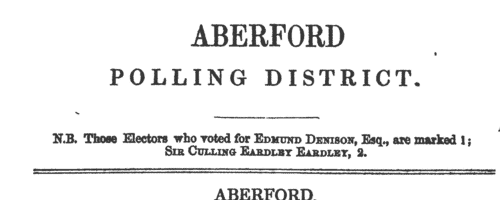
| Electors for Waddington
(1848)
On 14 and 15 December 1848 an election took place for a Knight of the Shire for the West Riding of Yorkshire in the House of Commons. The candidates were Edmund Denison and sir Culling Eardley Eardley, gaining 14,743 and 11,795 votes respectively. The county franchise at this period included freeholders of land worth 40s or more a year; £10 copyholders and long-leaseholders; and £50 short-leaseholders and tenants. This poll book was published in 1849.
Former poll books had been compiled from the sheriff's returns; but as these were now transmitted to the Home Office immediately after an election, in this instance the polling was marked from the check-clerk's returns, carefully compared with the registers marked in the poll booths at the time of voting.
The votes for the respective candidates are indicated by the numerals 1 (Denison) and 2 (Eardley). The omission of these numerals indicates that the elector did not vote. Many names which appear on the register of particular townships are completely omitted in this poll book: in all these cases, the same name will be found recorded in some other township, the elector having two or more qualifications. In such cases, his name only appears in the poll book in the actual township for which he chose to vote; or, if he did not vote at all, in that township for which he was qualified that lay closest to his actual residence.
The townships are arranged alphabetically within polling district; and within each township the names are arranged alphabetically by surname and christian name, and the elector's residence is given. Many of the electors resided outside the township for which they were qualified - some in other counties. Moreover, at the end of each polling district there is a list of persons registered to poll in that district, from townships is other districts. READ. Cost: £6.00.  | Sample scan, click to enlarge
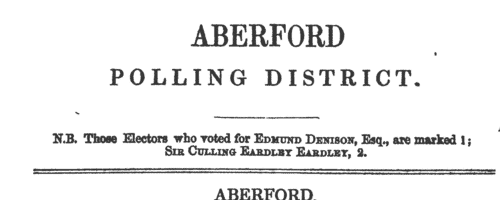
| Engineer Lieutenants of the Royal Navy
(1904)
The Monthly Naval List for November 1904, printed By Authority for the Admiralty, contains this List of Officers on the Active List of the Royal Navy with the Dates of their Seniority. The list is arranged by rank, and then by date of seniority: full names, including full middle names, are given. Each name is preceded (where appropriate) by the number of the ship in which serving; an 'm' indicating the holder was entitled to wear a medal; one or more asterisks for officers authorized to hold foreign orders. (C) after the name denotes an officer who had obtained his lieutenant's commission by competition at the Royal Naval College; (E) one who had obtained the same for meritorious examination there; or (G) one who had received an honorary certificate or had qualified as a Gunnery or Torpedo Lieutenant. There are also various sets of initials in italics indicating: AdC Aide-de-Camp to the King, AO Clerk to Secretary to a Flag Officer, CG Coast Guard, CGP Coast Guard Pension, Coll studying at Naval College, Dev an acting sub-lieutenant studying at Devonport, DY Dock Yard, GH Greenwich Hospital, GHP Greenwich Hospital Pension, GSP Good Service Pension, KHC Honorary Chaplain to the King, KHP Honorary Physician to the King, KHS Honorary Surgeon to the King, NH Naval Hospital, NID Naval Intelligence Department, NP Naval Pension, Po an acting sub-lieutenant studying at Portsmouth, PW Pension for Wounds, RNVR Royal Naval Volunteer Reserve, SC undergoing short course of instruction in torpedo, gunnery, &c., ScM Royal Naval School of Music, Sec Secretary to a Flag Officer, TB Torpedo Boat, TP Travers Pension, TS Transport Service, VY Victualling Yard. Large or bold letters in brackets or circles indicate qualifications in - G gunnery, I interpreting, N navigating, S secretary, T torpedo. There are lists for Flag Officers (Admirals of the Fleet, Admirals, Vice-Admirals, and Rear Admirals); Captains; Commanders; Lieutenants; Supplementary Lieutenants; Sub-Lieutenants (with class of their certificates in seamanship, navigation, pilotage, gunnery and torpedo); Midshipmen; Navy Cadets; Staff Captains; Engineer Rear-Admirals; Engineer Captains; Engineer Commanders; Engineer Lieutenants; Engineer Sub-Lieutenants; Chaplains (where these also acted as Naval Instructors, their seniority in that appointment is given as well); Naval Instructors (where these also acted as Chaplains, their seniority in that appointment is given as well); (Medical) Inspector-Generals of Hospitals and Fleets; Fleet Surgeons; Staff Surgeons; Surgeons; Paymasters-in-Chief; Fleet Paymasters; Staff Paymasters; Paymasters; Assistant Paymasters; Clerks; Assistant Clerks; Carpenter Lieutenants; Chief Gunners; Gunners; Chief Boatswains; Boatswains; Chief Signal Boatswains; Signal Boatswains; Chief Carpenters; Carpenters; Chief Artificer Engineers; Artificer Engineers; Chief Schoolmasters; Head Schoolmasters; Head Wardmasters.READ. Cost: £4.00.  | Sample scan, click to enlarge
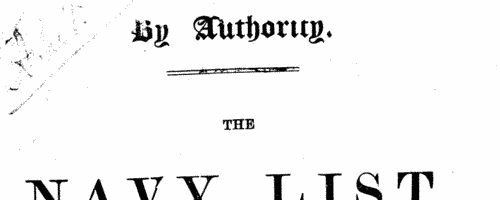
| Gunners of the Royal Navy
(1904)
The Monthly Naval List for November 1904, printed By Authority for the Admiralty, contains this List of Officers on the Active List of the Royal Navy with the Dates of their Seniority. The list is arranged by rank, and then by date of seniority: full names, including full middle names, are given. Each name is preceded (where appropriate) by the number of the ship in which serving; an 'm' indicating the holder was entitled to wear a medal; one or more asterisks for officers authorized to hold foreign orders. (C) after the name denotes an officer who had obtained his lieutenant's commission by competition at the Royal Naval College; (E) one who had obtained the same for meritorious examination there; or (G) one who had received an honorary certificate or had qualified as a Gunnery or Torpedo Lieutenant. There are also various sets of initials in italics indicating: AdC Aide-de-Camp to the King, AO Clerk to Secretary to a Flag Officer, CG Coast Guard, CGP Coast Guard Pension, Coll studying at Naval College, Dev an acting sub-lieutenant studying at Devonport, DY Dock Yard, GH Greenwich Hospital, GHP Greenwich Hospital Pension, GSP Good Service Pension, KHC Honorary Chaplain to the King, KHP Honorary Physician to the King, KHS Honorary Surgeon to the King, NH Naval Hospital, NID Naval Intelligence Department, NP Naval Pension, Po an acting sub-lieutenant studying at Portsmouth, PW Pension for Wounds, RNVR Royal Naval Volunteer Reserve, SC undergoing short course of instruction in torpedo, gunnery, &c., ScM Royal Naval School of Music, Sec Secretary to a Flag Officer, TB Torpedo Boat, TP Travers Pension, TS Transport Service, VY Victualling Yard. Large or bold letters in brackets or circles indicate qualifications in - G gunnery, I interpreting, N navigating, S secretary, T torpedo. There are lists for Flag Officers (Admirals of the Fleet, Admirals, Vice-Admirals, and Rear Admirals); Captains; Commanders; Lieutenants; Supplementary Lieutenants; Sub-Lieutenants (with class of their certificates in seamanship, navigation, pilotage, gunnery and torpedo); Midshipmen; Navy Cadets; Staff Captains; Engineer Rear-Admirals; Engineer Captains; Engineer Commanders; Engineer Lieutenants; Engineer Sub-Lieutenants; Chaplains (where these also acted as Naval Instructors, their seniority in that appointment is given as well); Naval Instructors (where these also acted as Chaplains, their seniority in that appointment is given as well); (Medical) Inspector-Generals of Hospitals and Fleets; Fleet Surgeons; Staff Surgeons; Surgeons; Paymasters-in-Chief; Fleet Paymasters; Staff Paymasters; Paymasters; Assistant Paymasters; Clerks; Assistant Clerks; Carpenter Lieutenants; Chief Gunners; Gunners; Chief Boatswains; Boatswains; Chief Signal Boatswains; Signal Boatswains; Chief Carpenters; Carpenters; Chief Artificer Engineers; Artificer Engineers; Chief Schoolmasters; Head Schoolmasters; Head Wardmasters.READ. Cost: £4.00.  | Sample scan, click to enlarge
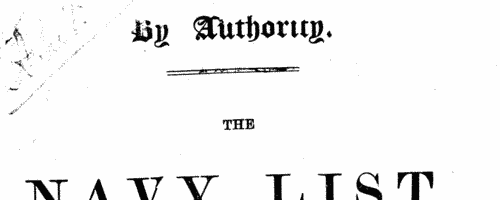
| Officers of H. M. S. Bacchante, in the Mediterranean
(1904)
The Monthly Naval List for November 1904, printed By Authority for the Admiralty, contains this List of Ships and Vessels of the Royal Navy with their Officers and Present Stations. The number after the name of the ship denotes the number of guns of 4-inch calibre and upwards. The tons represents the displacement tonnage. A letter P. in bold denotes Paddle Wheel; S. Single Screw. The italic abbreviations are F. D. Forced Draught; I. H. P. Indicated Horse Power; N. D. Natural Draught. All officers whose names are in italics are borne as supernumeraries or additions. (G) against an officer's name denotes that he is borne for gunnery duties; (N) navigating; (T) torpedo. In the cases where two dates are shown against the names of marine officers, the date in brackets is that from which his present sea time commenced.READ. Cost: £4.00.  | Sample scan, click to enlarge
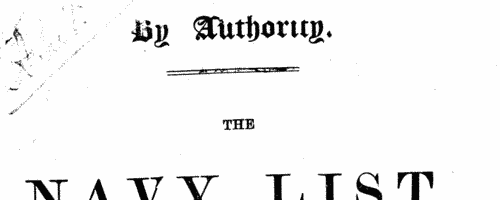
| Officers of H. M. S. Montague, in the Mediterranean
(1904)
The Monthly Naval List for November 1904, printed By Authority for the Admiralty, contains this List of Ships and Vessels of the Royal Navy with their Officers and Present Stations. The number after the name of the ship denotes the number of guns of 4-inch calibre and upwards. The tons represents the displacement tonnage. A letter P. in bold denotes Paddle Wheel; S. Single Screw. The italic abbreviations are F. D. Forced Draught; I. H. P. Indicated Horse Power; N. D. Natural Draught. All officers whose names are in italics are borne as supernumeraries or additions. (G) against an officer's name denotes that he is borne for gunnery duties; (N) navigating; (T) torpedo. In the cases where two dates are shown against the names of marine officers, the date in brackets is that from which his present sea time commenced.READ. Cost: £4.00.  | Sample scan, click to enlarge
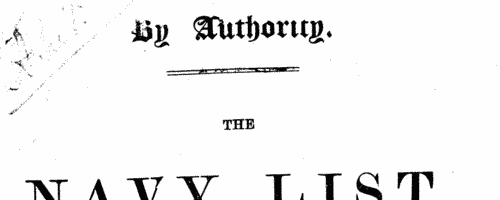
|
Research your ancestry, family history, genealogy and one-name study by direct access to original records and archives indexed by surname.
|












